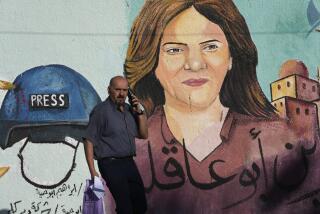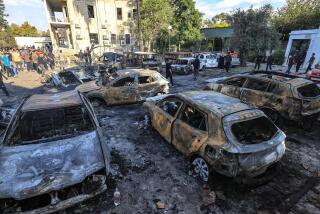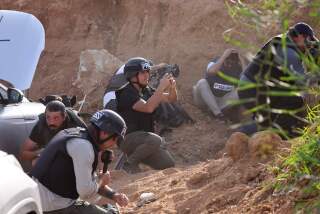News Organizations Mobilizing Too
Major news organizations are gearing up to cover a war in which--like U.S. troops preparing for combat--they still don’t know where they’ll be going, how many of their colleagues will follow and what kinds of battles they’ll see, if any.
“Whatever happens, this is going to be an extremely difficult conflict to report in a way that lives up to our expectations and our readers’ expectations,” said Phil Bennett, assistant managing editor for foreign news at the Washington Post.
Just as the war presents enormous obstacles to the military--a shadowy enemy hidden in remote places with equally shadowy allies in more than 50 countries--so it presents serious obstacles to the news media. Modern technology--modems, cell phones, laptops, satellites and digital photography--will enable reporters to transmit stories and photographs more easily than in past wars, but getting access to those locations will not be easy.
Some in the media are already worried that the Bush administration will make it even harder.
“I always hope for the best, but my expectation is that this administration will be as restrictive as the previous Bush administration in limiting access to battlefield areas and in trying to control the flow of any information from the Pentagon,” said Howell Raines, executive editor of the New York Times. “That was the pattern when [Vice President] Dick Cheney was secretary of Defense” during the Persian Gulf War in 1991.
Leonard Downie, executive editor of the Washington Post, voiced a similar concern about the administration’s possible “unwillingness to give journalists much access to troops overseas.” He cited the Gulf War experiences of Cheney, Secretary of State Colin L. Powell and Secretary of Defense Donald H. Rumsfield.
During the Vietnam War, journalists were given wide latitude in combat areas, and some military leaders later said many of the stories and pictures produced by those journalists helped foster antiwar sentiment in the U.S. During and after the Gulf War, many in the news media complained about the resultant restrictions on their movements.
Retired Army Col. David Hackworth covered the Gulf War for Newsweek and said afterward that the restrictions amounted to a form of “thought control” and gave the public a “sanitized” and “distorted” account of the war.
In a war on terrorists in isolated and far-off lands, where military success will be harder to achieve and define than in the Gulf War, journalists worry that the Pentagon will be even more reluctant to permit widespread media access. In a news conference last week, Rumsfield said he and his press aides were examining how the military had dealt with the press in prior conflicts. “[We] prefer to do it right and . . . hope to do that. . . . We’ll have to find ways that we are comfortable with and that you are comfortable with.”
Toward that end, Clark Hoyt, Washington editor for Knight Ridder, called several major news organizations late last week to suggest they meet soon to discuss among themselves how best to gain the Pentagon’s assurance that the news media will not be prevented from doing their job. Hoyt hopes his group will meet later this week with Torie Clarke, the Pentagon spokeswoman.
Hoyt was on the steering committee of a group of journalists that met with Pentagon officials and others for eight months in 1991 and ’92 to try to formulate a set of principles for the news coverage of combat. “We eventually came to agreement with the Pentagon on nine principles, although not until the Gulf War was over,” Hoyt said. “They were agreed to and adopted in March of 1992 and made a part of military doctrine. We are hoping and expecting that they are still in force today.”
The first of these principles says, “Open and independent reporting will be the the principle means of coverage of U.S. military operations.” Another of the principles says, “Journalists will be provided access to all major military units,” although it acknowledges that “Special Operations restrictions may limit access in some cases”--a point President Bush made in his speech to Congress and the nation last week, when he said the war effort would include “covert operations, secret even in success.”
Several of the principles worked out by the media and the Pentagon deal with pool coverage, the process whereby a strictly limited number of journalists is permitted to cover a specific operation or go to a specific area accompanied and supervised by the military. Pool members are expected to share their reporting and still and video pictures with others in the press corps.
Journalists recognize that security and logistics sometimes make pools the only reasonable way to provide coverage. But they complain that the military often uses pools to isolate journalists from the action, delay them and control what they see.
After the Gulf War, Malcolm Browne, a New York Times reporter who won a Pulitzer Prize for his coverage of the Vietnam War, said that the pool system in the Gulf turned the 1,400 reporters there into “essentially unpaid employees of the Department of Defense.” Thus, one of the principles approved by the journalists and the Pentagon in 1992 says, “Pools are not to serve as the standard of covering U.S. military operations.”
However they cover the war, it’s bound to be expensive for the nation’s news media, and it comes at a time when news organizations already face declining profits. Newspaper ad expenditures declined 4.3% in the first quarter of this year and 8.4% in the second quarter. In response, many newspapers announced major cutbacks in space and personnel.
With the economy spiraling still further downward after the terrorist attacks, advertising revenues figure to continue falling, perhaps precipitously. So far, most newspapers have been spending virtually whatever money is necessary to cover the attacks and their aftermath--publishing extra editions and extra pages.
“In the first few days, the extra newsprint we used was offset by not printing stock tables or a lot of sports,” says the Post’s Downie. “But that’s changing as we resume those things, and covering the war is going to get a lot more expensive when it comes time to cover the military action in a number of locations.”
Already, editors are moving correspondents around the globe like pieces on a giant international chess board--uncertain where the action will be but determined to be as prepared as possible.
The Dallas Morning News has sent its Bangkok reporter to Islamabad, Pakistan; its Panama correspondent to Jordan; and its Havana reporter to Uzbekistan. Knight Ridder newspapers have sent their Moscow correspondent to Tajikistan, their Bogota and Hanoi reporters to Islamabad, their Nairobi reporter first to Jerusalem and then to Bahrain, and a Miami reporter to Cairo. Steven Butler, foreign editor for the Washington bureau of Knight Ridder, said Monday he hopes to send his South African correspondent to Tajikistan and then to northern Afghanistan.
The Los Angeles Times sent one of its three Moscow-based reporters to northern Afghanistan and a second, along with colleagues from New Delhi and Hong Kong, to Islamabad. The paper has dispatched its reporter in Bogota to the United Arab Emirates and its Houston reporter to Madrid. The Times’ Atlanta correspondent is scheduled to go to Cairo today.
“Even with a large foreign staff, it’s hard to plan since, apart from the Taliban in Afghanistan, there’s no declared enemy,” said Simon Li, foreign editor of the Los Angeles Times, which has 28 correspondents in 22 foreign bureaus. That is second among general-interest dailies to the New York Times, which has 37 reporters in 25 foreign bureaus.
The Washington Post’s Bennett said his paper is “proceeding on the assumption that this will broadly be an unconventional war. We’re trying to position people with that in mind. We sent someone from Moscow down through Tajikistan to northern Afghanistan, sent our Jakarta and New Delhi correspondents and one of our Istanbul correspondents to Islamabad, and sent someone from Rome to Jerusalem, our Nairobi reporter to Yemen, and our Tokyo reporter to the Philippines.”
*
RELATED STORY
Magazines: At publications that focus on celebrities, editors are talking about altering coverage. E1
More to Read
Sign up for Essential California
The most important California stories and recommendations in your inbox every morning.
You may occasionally receive promotional content from the Los Angeles Times.










